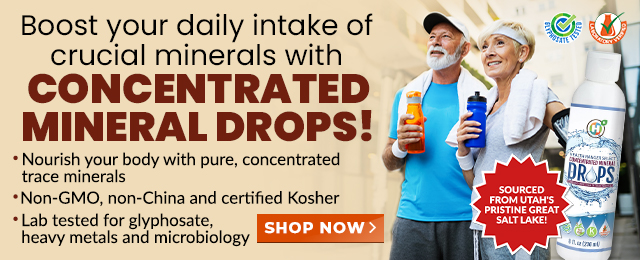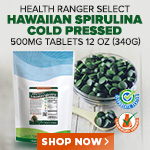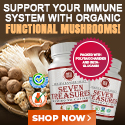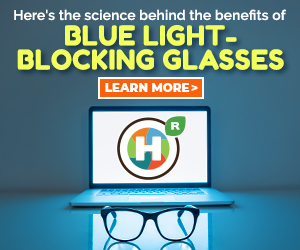
Think Zinc for Superbowl-Like Protection
Friday, March 05, 2010 by: Dr. Phil Domenico
Tags: zinc, nutrition, health news
- China's COVID nightmare returns: Students isolated, deaths hidden as regime doubles down on totalitarian policies
- Forgotten food survival secrets: How ancient preservation techniques can save your family when modern systems fail
- Axis of Evil: CDC and FDA concealed COVID vaccine dangers as injuries soared, new study reveals
- China' rocket fuel DUMP over 7 U.S. states adds to chemical chaos from chemtrails that sicken citizens and fuel sick care industry
- New, weaponized fluoride study ignores BRAIN DAMAGE while pushing forced medication of water
- Unlocking nature’s arsenal: The definitive guide to dietary supplements in the fight against cancer
- Massive Saharan dust plume the size of the U.S. barrels toward Florida, triggers health warnings
- Mount Etna erupts in fiery spectacle, forcing tourists to flee as ash plume reaches 4 miles high
- Trends forecaster Gerald Celente warns of global financial collapse and calls for cultural renaissance
- Globalists call for “celebration” of plunging human fertility as war against humanity accelerates
- Daily vitamin D may add years to your healthspan by preserving DNA, research reveals
- Federal authorities bust $25M COVID-19 relief fraud scheme, arrest 14 conspirators
- Leaked chromosome test results reveal: Olympic boxing champion Imane Khelif is BIOLOGICALLY MALE
- FDA and CDC to replace 80% of staff with AI agents to ‘Streamline’ operations - critics warn of depopulation agenda
- Cucumber recall over Salmonella contamination expands: What you need to know to protect your health
- Antidepressants linked to fivefold higher cardiac death risk in young adults, study warns
- Mars removes controversial TITANIUM DIOXIDE additive from Skittles candy
- Plant-based diet slashes cancer risk in groundbreaking study
- BEWARE: USDA allows genetically engineered vaccines to infiltrate organic food production
- Globalists call for “celebration” of plunging human fertility as war against humanity accelerates
- Holistic eye care and ancient practices challenge surgery’s reign in cataract treatment
- Biden administration targeted mask and vaccine opponents as "terrorists," new docs reveal
- Key to aging gracefully, SUNLIGHT provides vitamin D, boosts nitric oxide, and preserves telomeres
- Amazing microscopy photos reveal how freezing crystals attempt to mimic electronic structures they are touching
- Unlocking methylene blue: A century-old compound steps into the cancer spotlight
- HEALTH SECRETS: How to Instantly Block MSG Toxicity Using Natural Substances (and the secret of Methylene Blue)
- LYME DISEASE on the RISE raising suspicion it's still part of U.S. military bioweapons program gaining traction for Lyme Disease PLANDEMIC
- MSG EXPOSED: Hidden Neurotoxins Found in Groceries, Snacks and Popular Fast Food Menus
- Morphic resonance “remote viewing” reveals iconic Middle East images of stealth bombers, a falcon and a one-horned ram
- Is Del Bigtree leaving MAHA? Bigtree blasts the MAHA report's shocking silence on vaccine failure and vaccine injury
- Vietnam moves to block Telegram messaging app over claims of “anti-state” content and illegal activity
- Breaking the aging code: How diet shapes longevity from breakfast onward
- WAR ON COGNITION: The Coordinated Assault on Your Brain and How to Defend Yourself Against Every Attack
- Study: Methylene blue and near-infrared light show promise in preventing brain degradation
- Sodium-ion battery BREAKTHROUGH offers a faster, safer, and more sustainable revolution in energy storage
- A closer look at the corporate influences steering the CDC and manipulating US health policy
- WAR ON COGNITION: The Coordinated Assault on Your Brain and How to Defend Yourself Against Every Attack
- Big Pharma's Dirty Secret: How Prescription Drugs Are Starving Your Body of Essential Nutrients
- RED ALERT: Nuclear War Between India and Pakistan Could Trigger Global Catastrophe… full RISK ANALYSIS
- Singapore's draconian vaccine mandate: Citizens face jail time for refusing FORCED medical procedures that do HARM
- MSG EXPOSED: Hidden Neurotoxins Found in Groceries, Snacks and Popular Fast Food Menus
- HEALTH SECRETS: How to Instantly Block MSG Toxicity Using Natural Substances (and the secret of Methylene Blue)
- Globalists call for “celebration” of plunging human fertility as war against humanity accelerates
- JESUS NEVER SPOKE ENGLISH: Historical facts on why the Bible you’re probably reading has been altered, redacted or hidden from much of its original meaning
- Landmark study of 85 million reveals shocking surge in heart attacks, strokes, and sudden death following the notorious COVID-19 jab
- BEWARE: USDA allows genetically engineered vaccines to infiltrate organic food production
- Silent catastrophe: COVID-19 vaccines linked to plummeting fertility rates, Czech data reveals
- Doctors are still puzzled about “long vax,” a set of symptoms linked to COVID-19 vaccines
- Why All Government Officials and Big Tech CEOs Who Engage in Systematic Viewpoint Censorship Must Be ARRESTED, Prosecuted, and Sentenced to Life in Prison
- WHO Pandemic Treaty sparks sovereignty concerns amid secretive voting and U.S. withdrawal
- Canada's COVID cover-up: Health officials swore secrecy to protect Trudeau from vaccine scandal
- Brushing with poison: Study finds toxic heavy metals in 90% of toothpaste brands, including those for children
- Head of L.A. Port warns of incoming plunge in U.S. supply chain, empty shelves and inventory depletion in 5-7 weeks
- Shocking study reveals cell phone radiation causes BLOOD CLUMPING in minutes
- Red Cross issues warning to stop blood plasma donations from vaccinated people
- Scientists confirm: GENIUS brain function can be spontaneously unleashed in humans without any apparent cause
- EPA advisor admits the agency is funneling billions to climate groups ahead of Trump’s return to White House
- HYSSOP: What research reveals about the health benefits of this ancient holy herb
- Two containers with completed ballots fall out of truck in Florida
- Newly released JFK files reveal Pentagon's role in creating Lyme disease and covid in the same lab
- Mike Adams releases country western hit single: Goin’ Back in Time is Comin’ Home
- Global leaders unite to clamp down on “misinformation” with UN-backed Cascais Declaration
- BREAKING: 2025 NDAA authorizes mandatory military draft of WOMEN across America… as Pentagon pursues global NUCLEAR war with both Russia and China at the same time
- I Want My Bailout Money – new song released by Mike Adams
- Michael Yon warns of a ZIONIST TAKEOVER in Trump’s second administration
- Ozempic and Wegovy weight loss drugs are injectable LIZARD VENOM PEPTIDES that may unleash a devastating wave of organ failure… side effects align with symptoms of SNAKE BITES
- BOMBSHELL: DNA testing kits are a SCAM to develop ethnic-specific bioweapons
- The Health Ranger releases “Vaccine Zombie” song and music video, using AI-animated zombies for the music video
- These 13 countries just signed an agreement to engineer a global FAMINE by destroying food supply
- Israeli soldiers accused of even more torture and abuse in the West Bank
- RFK Jr. clears key hurdle: Sen. Susan Collins backs controversial HHS nominee, signaling a new era for health policy
- Sermon 30: How Jesus reveals Caesar’s FAKE CURRENCY and FALSE AUTHORITY
Skin is a front line of protection, but diseases like acne breach that defense. Zinc benefits conditions like acne. It helps heal wounds and promotes healthy skin and hair, due to its antioxidant and antibacterial properties and its role in inflammation and repair. Zinc is a cofactor in hundreds of enzymes. The macromolecules of life (DNA, RNA, protein) cannot be made without zinc.
Another front line resides in the gut, where toxins, allergens and invaders are at play. Zinc proteins trap poisons before they enter the bloodstream. A string of zinc ions on a molecule called metallothionein (MT) prevents toxin entry into the body. Several mercury ions can get stuck on one MT molecule and are then eliminated through the feces. Meanwhile, displaced zinc ions from MT activate enzymes involved in inflammation, digestion and repair. This elegant system depends on adequate zinc intake. It also suggests that zinc protects against tainted fish. Zinc carnosine also protects against gut damage from pain medication.
MT proteins are also located in the brain, liver and kidneys, if toxins manage to evade defenses in the gut, lungs or skin. MTs are involved in tumor suppression and oxidative stress and protect against autism, with adequate zinc intake.
MTs also prevent cadmium, silver and arsenic poisoning. MTs also bind copper and may reduce its absorption after long periods of high zinc intake. Normal zinc intake does not affect copper uptake, and taking copper supplements corrects any antagonism. Most multivitamin and mineral supplements are formulated with this in mind. Unrefined organic foods can provide proper mineral balance without heavy metal contamination.
All living things need zinc, which is indispensable for growth and development, immunity, neurological function, and reproduction. Zinc is essential in enzymes like carbonic anhydrase, required for pH balance and gas/fluid/ion exchange; for alcohol dehydrogenase to help detoxify alcohol; and for carboxypeptidase A to break down proteins. Zinc also supports protein structure, as in the antioxidant superoxide dismutase (SOD). Zinc fingers are proteins that dance across DNA to regulate gene expression. Loss of zinc from membranes invites oxidative damage and impaired function. Zinc also influences hormone release and nerve impulses.
Zinc is also important for diabetes. It helps regulate insulin production and sugar utilization. Several zinc-containing enzymes are adversely affected in diabetics, who should probably take zinc supplements and extracts that enhance zinc absorption.
Even mild zinc deficiency can lead to impaired physical/mental development and increased infections in young children. Other people at risk include pregnant/lactating women, the elderly, vegetarians, and malnourished individuals. Severe zinc deficiency is associated with dwarfism, night blindness, rashes, chronic severe diarrhea, immune deficiencies, impaired wound healing, diminished appetite, impaired taste sensation, behavioral disturbances and other serious disorders.
Zinc is found in oysters, beef, beans, mushrooms, soy, nuts, fish, dairy and wheat germ. Grains and legumes contain little zinc and have anti-nutrients that prevent zinc uptake, such as phytate. Sprouting reduces anti-nutrients and increases zinc uptake. High-dose iron can also interfere with zinc absorption.
The best source of zinc is food of animal origin, but enormous quantities may be needed to treat conditions like acne, autism or diabetes. Zinc supplements are often beneficial, especially for people at risk. Like in football, zinc forms a powerful front line, but an entire team of nutrients is needed to achieve Superbowl-like success.
References
Christian P, West KP, Jr. Interactions between zinc and vitamin A: an update. Am J Clin Nutr 1998;68:435-41S.
Food and Nutrition Board, Institute of Medicine. Zinc. Dietary reference intakes for vitamin A, vitamin K, boron, chromium, copper, iodine, iron, manganese, molybdenum, nickel, silicon, vanadium, and zinc. Washington, D.C.: National Academy Press; 2001:442-501.
Hambidge M. Human zinc deficiency. J Nutr 2000;130:1344-9S.
Mahmood, A, et al. Zinc carnosine, a health food supplement that stabilizes small bowel integrity and stimulates gut repair processes. Gut 2007;56:168-75.
Melinkeri RR, Sontakke AN, Kulkarni AM. Serum zinc and zinc containing enzymes in diabetes mellitus. Indian J Med Sci 1990;44:173-7.
O`Dell BL. Role of zinc in plasma membrane function. J Nutr 2000;130:1432-6S.
Sandstrom B. Micronutrient interactions: effects on absorption and bioavailability. Br J Nutr 2001;85:181-5S.
Song MK, Rosenthal MJ, Naliboff BD, Phanumas L, Kang KW. Effects of boirne prostate powder on zinc, glucose and insulin metabolism in old patients with non-insulin-dependent diabetes mellitus. Metabolism 1998;47:39-43.
http://www.altmedicinezone.com/alternative-t...
http://www.deznit.com/content.asp?ID=18&page...
http://lpi.oregonstate.edu/infocenter/minera...
http://www.healing-arts.org/mehl-madrona/mmz...
About the author
Dr. Phil Domenico is a nutritional scientist and educator with a research background in biochemistry and microbiology. Formerly an infectious disease scientist, he now works as a consultant for supplement companies and the food industry.Zinc at FETCH.news
Get independent news alerts on natural cures, food lab tests, cannabis medicine, science, robotics, drones, privacy and more.
Take Action: Support Natural News by linking to this article from your website
Permalink to this article:
Embed article link: (copy HTML code below):
Reprinting this article:
Non-commercial use OK, cite NaturalNews.com with clickable link.
Follow Natural News on Facebook, Twitter, Google Plus, and Pinterest
Science News & Studies
Medicine News and Information
Food News & Studies
Health News & Studies
Herbs News & Information
Pollution News & Studies
Cancer News & Studies
Climate News & Studies
Survival News & Information
Gear News & Information
News covering technology, stocks, hackers, and more



"Big Tech and mainstream media are constantly trying to silence the independent voices that dare to bring you the truth about toxic food ingredients, dangerous medications and the failed, fraudulent science of the profit-driven medical establishment.
Email is one of the best ways to make sure you stay informed, without the censorship of the tech giants (Google, Apple, Facebook, Twitter, YouTube, etc.). Stay informed and you'll even likely learn information that may help save your own life."
–The Health Ranger, Mike Adams












































